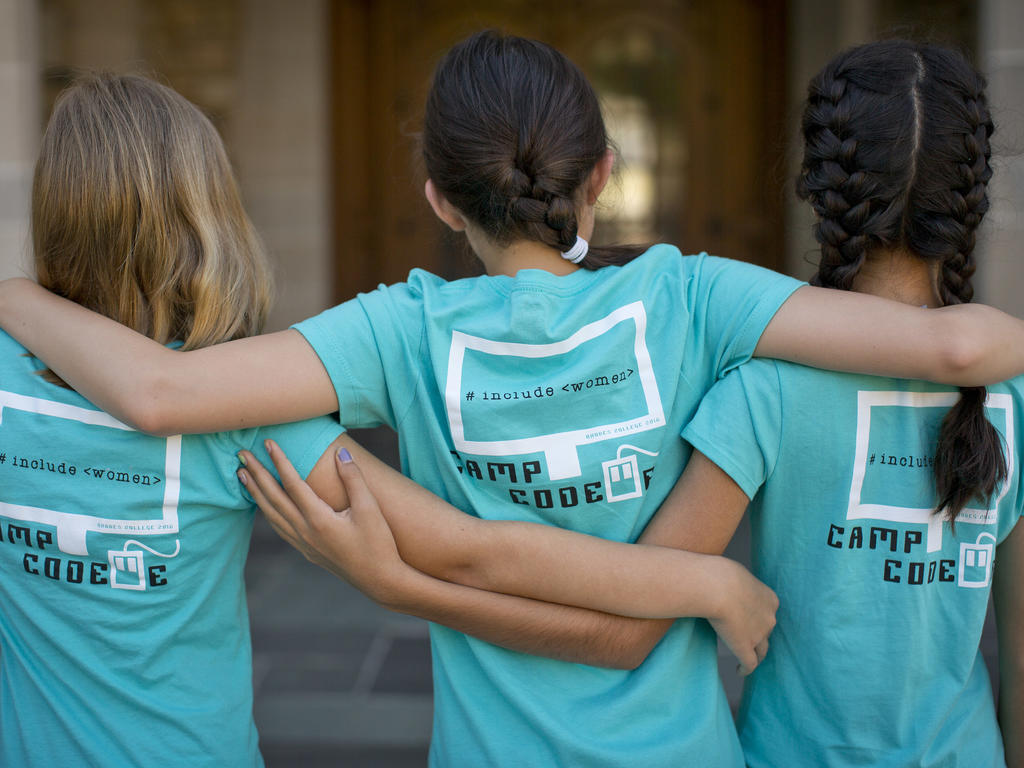This summer, Rhodes College hosted its second annual computer-coding camp for girls aged 11 to 18. Called Camp Codette, the program is the brainchild of students Thomas Threlkeld ’15 and Haley Adams ’15, and Dr. Betsy Sanders, associate professor of mathematics and computer science.
Following ongoing discussions about diversity across the Rhodes campus, Sanders noted to one of her classes that the field of computer science has a wide gender gap in both postsecondary degrees granted and jobs in the field. Studies have indicated that around 10 percent of bachelors’ degrees in computer science are awarded to females.
This lack of diversity in the field is important, says Sanders, because diversity is crucial to a company’s bottom line. “Diversity brings money to companies. It’s important to see other perspectives and share things we wouldn’t have learned otherwise. If we think about this in light of women being responsible for roughly 85% of purchase decisions in the United States, getting more females into technology is a no-brainer.”
From this classroom discussion came the idea of reaching out to help girls develop an interest in the computer science field. Initial funding for the camp came from Threlkeld, who, in addition to a $5,000 grant from the Clarence Day Scholarship, obtained a $10,000 grant from Google’s Ignite CS program. A Google representative consults with the Rhodes staff about the curriculum and logistics of the camp, and Google representatives take an active role in mentoring the undergraduate students through the process, as their main initiative for providing funding for the camp is to keep the undergraduate students engaged and excited about continuing with computer science.
Adams, who graduated in May, returned to campus this summer to help administer the camp, along with Sanders and Chelsey Thompson ’15, also a veteran counselor of the first Camp Codette. They were joined by Prof. Brian Larkins of the mathematics and computer science department, along with Casey Means ’16, Emma Goff ’19, Haider Tiwana ’17, Jean Xiong ‘17, Josh Ladd ’17, Kyanna Young ’18, Olivia Burchett ’18, Olivia Burton ’17, and Rachel Fox ’19. Each counselor had to undergo a training course on teaching and was responsible for teaching one full class during the camp.
A topic that returned from last year was a session on Scratch (a block-based coding platform that allows users to create applications and programs without actually needing to type out their code). One goal of the camp is to revamp its curriculum each year with unique projects and points of focus, thus encouraging students who have already participated to return. This year’s camp featured a new virtual reality session where, using an engine called Unity, the Codettes created a video game to be played on their cell phones using Google Cardboard glasses. The session was taught by Adams, who was also responsible for communicating paperwork, data reports, and interpretive analytics on the camp to Google. They also introduced a more advanced session for middle schoolers highlighting the fundamental principles in the code writing application Python.
The new curriculum was designed for middle school and high school-level students, and altogether the camp attracted more than 75 students from public and private schools throughout the city of Memphis, many of whom had attended last summer, as well.
While coding is the primary focus of Camp Codette, it also boasts traditional camp activities: swimming, scavenger hunts, and, of course, snack breaks. With fun, interactive projects, and a healthy dosage of recreational time, participants in Camp Codette are learning coding fundamentals that they can carry long into the future. Sanders states it simply: “If you can get students to get together as a group and work towards something powerful, then they’re more likely to continue on in computer science. I think confidence is everything, and if more females have confidence, then it’s all the better.”
By Kenneth Piper '17
